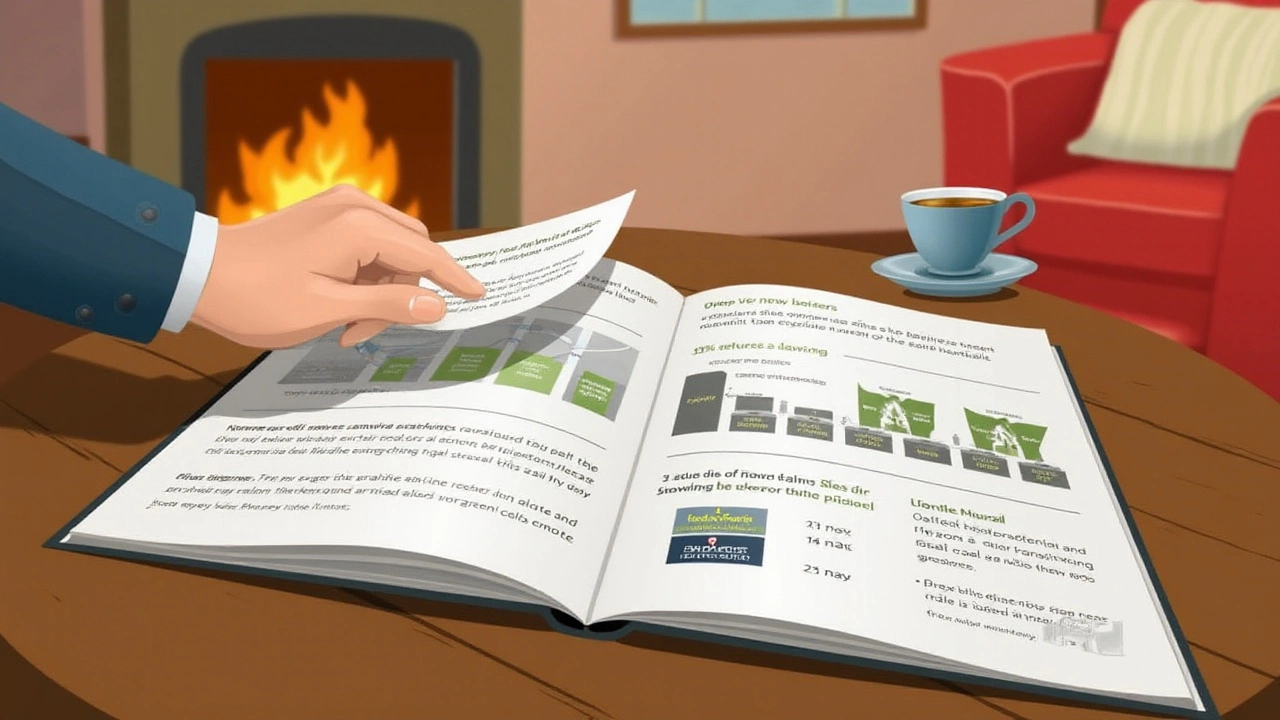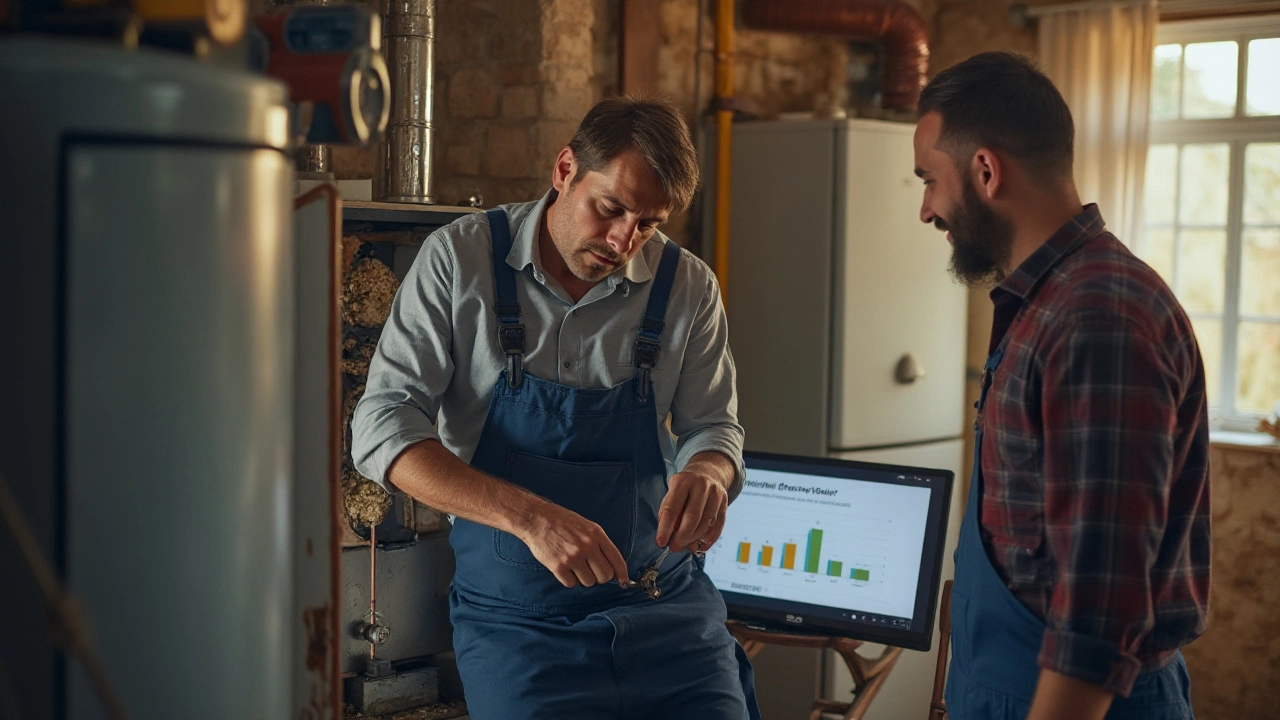When your boiler hits the fifteen-year mark, it's natural to wonder if it's time for a new one. After all, home heating accounts for a significant portion of energy costs, and nobody likes unexpected breakdowns.
Advancements in boiler technology have made new units more efficient than their older counterparts, potentially offering savings on energy bills. But before jumping into replacement mode, it's important to consider the signs your boiler might be giving you.
Understanding what's involved in maintaining an aging system versus switching to a modern energy-efficient model is key to making the right call for your home and wallet.
Understanding Boiler Lifespan
Understanding how long a boiler should last is key to making informed decisions about maintenance and replacement. On average, a boiler’s lifespan is around 15 to 20 years, although this can vary significantly based on several factors like type, brand, and maintenance frequency. Regular maintenance can extend a boiler's life, whereas neglecting it can lead to more frequent breakdowns. This fact alone makes yearly check-ups crucial. But age isn't the sole indicator of performance. Even if a boiler has been around for fifteen years or more, it might be perfectly functional if well cared for, showing no significant degradation.
Of course, boilers, just like vintage cars, have wear and tear. Parts will eventually wear out, causing issues in your heating system's efficiency. As they age, their ability to heat water efficiently diminishes, leading to higher energy bills. This is when you might start comparing the cost of running your current model versus investing in a new, more energy-efficient option. A modern boiler replacement could be as much as 30% more efficient, helping save considerably on bills. To put this into perspective, modern boilers often boast a 90% efficiency rating, compared to 70-75% for old systems. Still, switching should be weighed against remaining repair costs and ongoing efficiency levels.
Despite this general information, it's paramount to consider the specific signals your own boiler gives you. Frequent repairs and growing heating costs could be signs that your boiler is living on borrowed time. Pay attention to irregular noises and uneven heating distributions, as these can highlight more symptomatic problems within the unit. That buzzing or banging might sound like character, but it often indicates repair is more frequent than it should be. Sometimes expert advice becomes necessary.
"A well-maintained boiler may well last beyond its typical lifespan, but it's crucial to balance ongoing costs with performance," says J. Weathrix, a respected specialist in home heating systems.
Another factor to weigh is the role of technology in changing lifecycle expectations. As innovations in home heating continue, new models don't just offer better energy efficiency but often include enhanced features like easy-to-use touch controls, better diagnostics, and sometimes even smart technology integration. These can make for a compelling argument if your home heating system still uses a thermostat that belonged in last century's sci-fi movies.

Signs of Aging Boilers
Boilers are like the unsung heroes of our homes, working tirelessly behind the scenes to keep us warm. Yet, like all heroes, they have a shelf life, and recognizing when your boiler is showing its age is key to avoiding a heating crisis. A sure sign of an aging boiler is its frequent need for repairs. If you've had to call the technician more than once over the past year, especially during those frigid months, that's a red flag. Old boilers, around the fifteen-year mark, start demanding more attention and come with higher repair bills. They might seem fixes at first, but these costs add up quickly, nudging you to consider a replacement.
Another telltale sign is the visceral feeling of unease you get when you hear strange noises emanating from the bowels of the boiler room. Clanking, banging, or even rattling might signal something more than just random sounds. These noises could be warnings of internal components losing their grip or worse, about to give out completely. These sounds are not just disruptive but can point to efficiency issues as well. An inefficient boiler not only struggles to heat your home effectively but also leads to a spike in your energy bills, making you question the true cost of holding onto this old machine.
Yet another indicator is the noticeable inconsistency in heating. Have you noticed some rooms feeling like a sauna while others remain icy cold? Such uneven heating is often a sign of an aging boiler struggling to distribute heat evenly throughout your home. This patchwork warmth isn't just inconvenient; it also forces the system to work harder, putting more wear and tear on its already old parts. If your boiler leaves you shivering in one room while sweating in another, it's a classic symptom that it might be time for an upgrade.
Leaking is also a significant alarm bell. Even minor leaks can be a serious issue that requires prompt attention. Water where it shouldn't be could mean internal parts have corroded, seals have worn out, or worse. Not only is the water a slipping hazard and a potential cause of other household damage, but it also signals that your boiler is not working as efficiently as it should. If you spot pools of water or dampness around your boiler, it’s time to get it checked by a professional.
Carl A. Smith, a renowned heating expert, once stated, “A diligent eye towards your boiler’s performance can save you the headache and expense of a total breakdown.”
Finally, one of the most visible signs is poor energy efficiency, reflected in escalating fuel bills. As they age, boilers generally become less efficient due to wear and internal deterioration. What you might have saved on repairs, you may lose - and more - in energy costs. Utilizing current data, upgrading to a new energy-efficient model can potentially save you up to 30% on your annual heating costs, which is no small change. And in today's world, where energy efficiency is not just about cost but also about reducing your carbon footprint, considering a switch becomes more than just an economic decision.
Keeping an eye out for these signs can be crucial in deciding whether it's time to invest in a new boiler or eke out a little more life from your current one. Paying attention to these signals and acting swiftly can prevent unpleasant surprises and help make your home more comfortable and cost-effective.

Cost-Benefit Analysis
When it comes to deciding whether to replace your 15-year-old boiler, a deep dive into the costs and benefits is essential. We often find ourselves grappling with the repair versus replacement conundrum, especially as winter months loom. Boilers are the heart of our home heating system and their efficiency has a direct impact on those energy bills that none of us fancy seeing escalate. So, let's break down what you might expect financially and practically when considering a new boiler replacement.
First, let's talk numbers. A broken or inefficient boiler tends to guzzle more energy, leading to higher utility bills. According to the U.S. Department of Energy, heating and cooling account for about 56% of the energy use in a typical American home. If your boiler is struggling to pump heat efficiently, it could mean your hard-earned money is literally going up in smoke. With newer models, the efficiency can jump substantially. Modern boilers can achieve 95% efficiency, unlike those elder models that might barely reach 70-80%. It's worth considering that this leap in efficiency could save hundreds of dollars annually on heating costs.
On the other hand, installation of a new boiler is a significant investment. A good quality boiler, while pricey upfront, is like any good investment—it can pay off in the long run. When evaluating the purchase, it’s not just the price tag of the new boiler you need to consider, but also the potential benefits like energy efficiency savings, rebates, and increased comfort at home. Did you know that several governments offer incentives for installing energy-efficient heating systems? These incentives can significantly offset initial costs, effectively shortening the payback period.
"The hidden costs of deferring the inevitable replacement of your heating system are often greater than one expects," notes Jessica Honeywell, an energy efficiency specialist.
Let's peek into repair costs too. Older boilers typically require more frequent repairs as components wear out after years of hard work. You may find yourself replacing valves, fans, or thermistors, which might initially seem affordable but can add up quickly. If your trusted repair technician is becoming a regular visitor, it might signify that a full boiler replacement could be more cost-effective in the long run. Don't forget, frequent repairs not only drain your wallet but also heighten the risk of sudden breakdowns when you least expect them.
Incentives and Rebates
An aspect that should not be overlooked is the availability of rebates for energy upgrades. Programs like ENERGY STAR in the United States or similar initiatives in other regions often provide rebates for transitions to high-efficiency systems. These can be significant. Additionally, using a heating system that's kinder to the environment boosts your green credentials—not too shabby for anyone keen on reducing their carbon footprint along with their bills. Always keep an eye out to utilize these opportunities to your advantage.
Finally, it’s all about finding a balance. Weighing the initial outlay against ongoing costs and potential savings is a savvy way to evaluate your best course of action. Even setting aside the financial angle, the peace of mind that comes with installing a new, reliable heating system is invaluable, smoothing out concerns as the cold months settle in.Home heating is not just about counting costs; it’s about comfort and peace of mind, making it a decision well worth the time and thought.

Modern Alternatives
In the world of home heating, updated technology can make a world of difference. If your current boiler has been loyally chugging along for 15 years, it may be high time to consider what the latest models offer. Modern boilers are not only more compact and quieter, but they're also significantly more energy-efficient compared to ones made over a decade ago. These advancements can translate into lower energy bills and reduced carbon footprints, both beneficial for your wallet and the planet.
One type worth noting is the high-efficiency condensing boiler. It captures heat that would otherwise be lost through exhaust gases and repurposes it to warm your home. This means less energy waste and more effective use of fuel. Many of these boilers boast efficiency ratings of over 90%, a stark contrast to older models that might hover around the 70% mark. This increased efficiency can lead to between 10-30% savings on your annual heating costs, which is not an amount to scoff at.
Then we have combi boilers, a growing favorite for their dual functionality. These boilers are designed to serve both central heating and hot water needs without the need for a separate water tank. Their space-saving design makes them ideal for smaller homes or for those looking to maximize their living space. Not only are they efficient, but they also provide hot water on demand, meaning there's no waiting for a tank to heat up.
An insight from the Energy Saving Trust points out that, "Replacing a gas boiler with a modern condensing unit and improving your controls will save you on heating bills and reduce carbon emissions."
"A-rated boilers operate at 90% efficiency and could repay their initial costs in only a few years," they highlight.Additionally, many of these new boilers are compatible with smart technologies. These allow you to control your heating system through your smartphone or other smart devices, offering customization and convenience at your fingertips.
Government incentives can also make updating to a modern alternative more appealing. Various programs and tax breaks may be available, incentivizing homeowners to install energy-efficient systems. Checking local or federal programs could yield additional savings, helping offset installation costs and enhancing long-term value.
For those who prefer an alternative to gas, heat pumps present a compelling option. Although a more significant initial expense, they draw heat from the environment and can be a smart choice in areas with milder climates. Though not a type of boiler per se, they represent the broader category of modern heating solutions worth considering alongside traditional boiler replacements.

